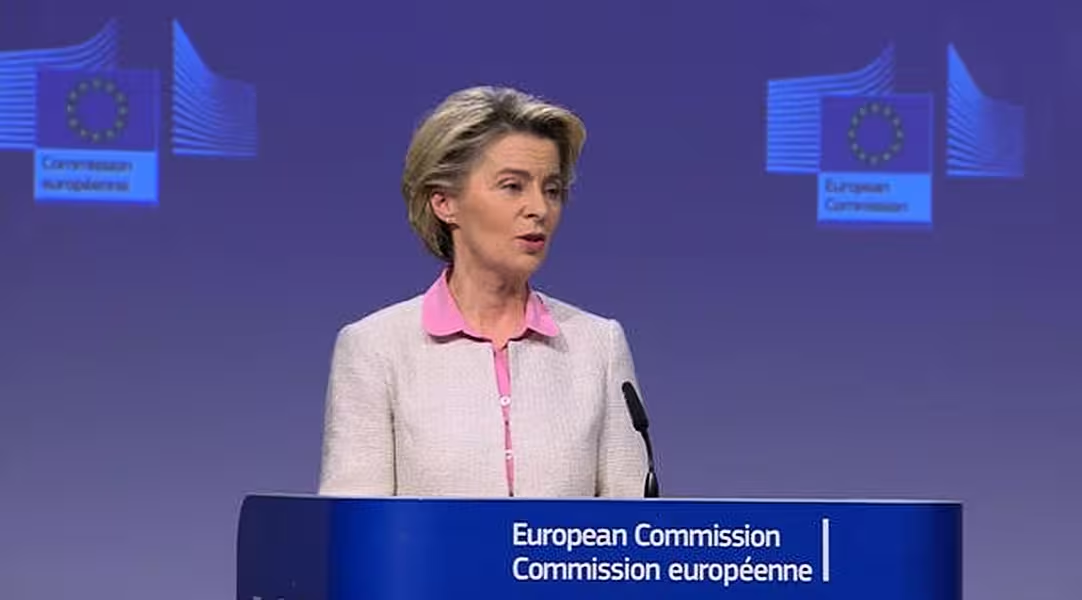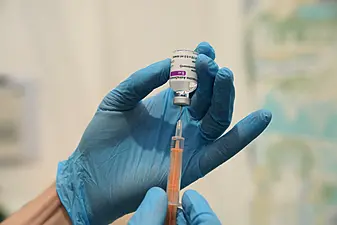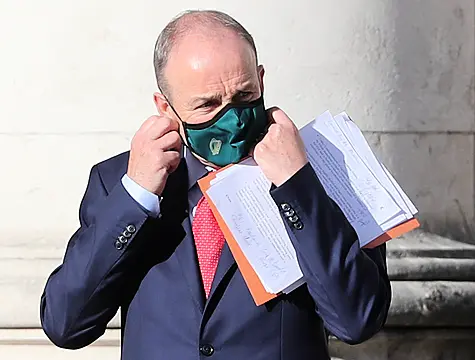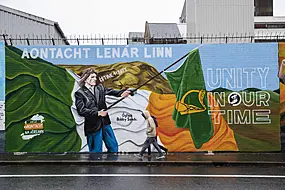The Taoiseach has said the European Commission’s move to invoke article 16 of the Northern Irish protocol was made as “people were blindsided in an exclusive focus on the row with AstraZeneca”.
The Irish Times reports that Micheál Martin rejected Northern Ireland First Minister Arlene Foster’s view that the plan was an act of hostility towards the region.
The Commission’s short-lived but widely-condemned move to trigger the article intended to prevent a “backdoor” on its plan to limit shipments of AstraZeneca’s Covid-19 vaccine to Britain.
Speaking from his home in Cork, Mr Martin said the move should be seen in the context of the “very bitter row” between the EU and vaccine manufacturer AstraZeneca.
While he could understand Ms Foster’s frustration, Mr Martin said the move “wasn’t in any way an act of hostility towards Northern Ireland but it seems to me people were blindsided in an exclusive focus on the row with AstraZeneca as to the negative implications for the operation of the protocol.”
“From my perspective, the whole issue was a fallout from an increasingly tense and acrimonious row between AstraZeneca and the European Commission in respect of the contracts that had been entered for the supply of the vaccines,” he added.
Mr Martin said the move to invoke article 16 was a mistake but insisted that no lasting damage had been done.
Retrograde step
It would be a “hugely retrograde step” if the Northern Ireland protocol was undermined after briefly becoming “collateral damage” in the row over vaccine supplies, Mr Martin said.
DUP leader Ms Foster has urged the UK prime minister to tear up and replace the protocol, which is designed to allow the free movement of goods from the EU into Northern Ireland and prevent a hard border.
Mr Martin said: “It’s important for businesses and jobs in Northern Ireland that they have access to the single market – it’s of huge benefit to industry in Northern Ireland, to those involved in agricultural products and a wide range of SMEs.
“In my view, it would be a hugely retrograde step for Northern Ireland if the protocol was undermined in any way and that’s why we moved so quickly last evening to ensure no damage was done.”
Mr Martin said that he had spoken to Boris Johnson about the situation and they agreed on the importance of the protocol in allowing seamless economic activity on the island of Ireland.
He welcomed the response of the European Commission in reversing the move to invoke article 16 following various diplomatic conversations, including phone calls between Mr Martin and Commission president Ursula von der Leyen on Friday night.
“They listened to what we had to say and took stock of the situation and pulled back from what they had originally been proposing,” he said.
UK reassured
Meanwhile in the UK, ministers have expressed confidence that the European Union will not block vaccines entering after the two sides agreed to a “reset” in relations to de-escalate tensions.
Cabinet Office minister Michael Gove said on Saturday that the EU recognises it “made a mistake” in its move to trigger article 16.
Foreign secretary Dominic Raab said he was “reassured the EU has no desire to block suppliers fulfilling contracts for vaccine distribution to the UK” after talks with European Commission executive vice-president Valdis Dombrovskis.

Mr Gove welcomed the EU having “stepped back” from triggering the article.
“I think the European Union recognises that they made a mistake in triggering article 16, which would have meant the re-imposition of a border on the island of Ireland,” he told reporters.
“I’ve spoken to the European Commission vice-president Maros Sefcovic about this and we both agreed that we need a reset, that we need to put the people of Northern Ireland first.”
The UK Cabinet minister said that the government was “confident that we can proceed with our vaccine programmes exactly as planned” after discussions between Mr Johnson and Ms von der Leyen.

It was understood vaccines crossing between the Republic and Northern Ireland will now be recorded in Dublin but will not be at risk of being blocked.







